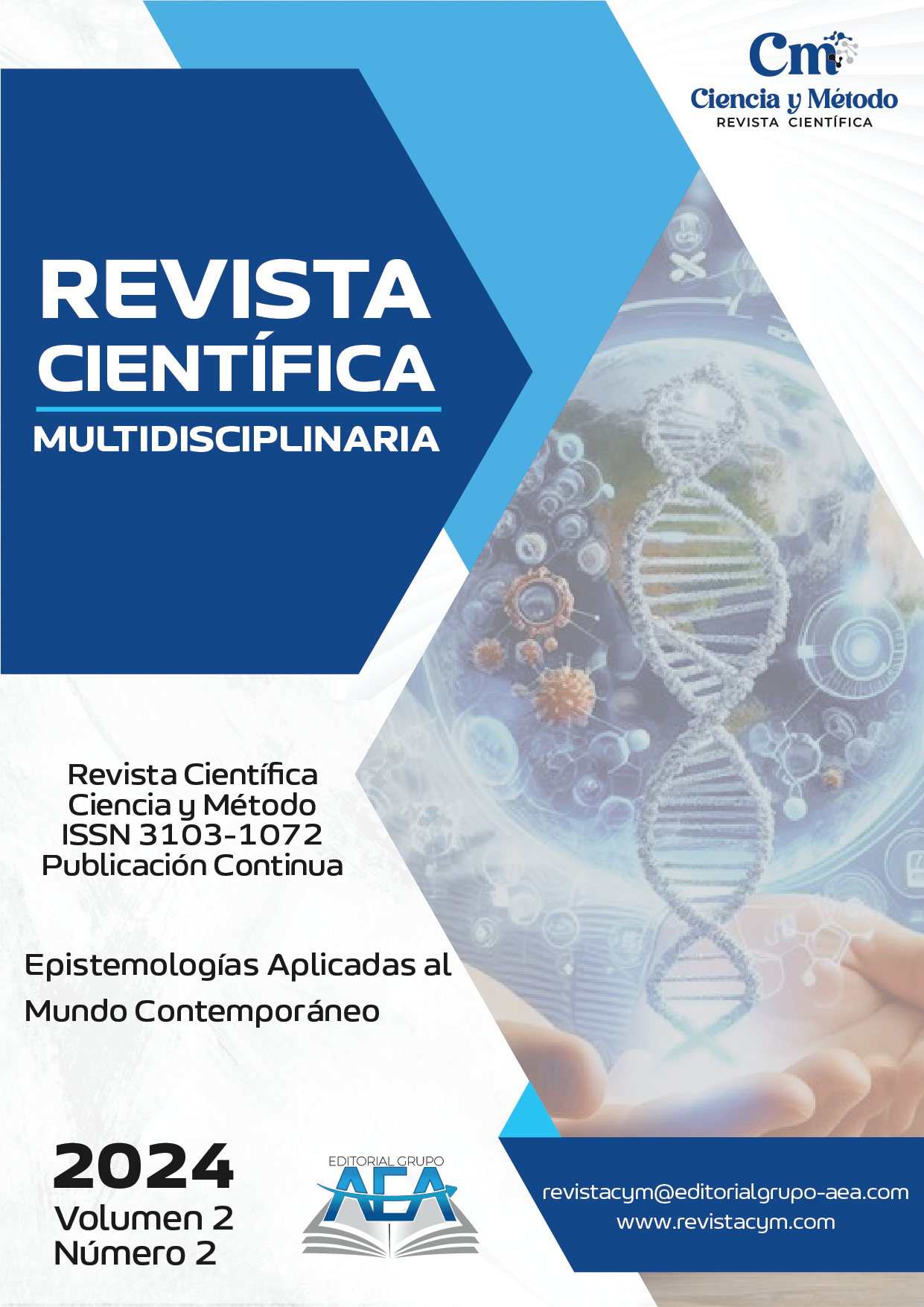Educación ambiental como herramienta para fomentar la conciencia ecológica en estudiantes de secundaria
Contenido principal del artículo
Resumen
El estudio analiza críticamente la educación ambiental como herramienta para fortalecer la conciencia ecológica en estudiantes de secundaria, considerando la creciente crisis ambiental global. Se aplicó una revisión bibliográfica sistemática de investigaciones publicadas entre 2000 y 2024, seleccionadas de bases de datos de alto impacto. Los resultados identifican que estrategias como proyectos sobre problemáticas locales, actividades al aire libre y el uso de recursos digitales interactivos contribuyen a aprendizajes significativos y a la adopción de conductas sostenibles. Además, se determinó que la participación activa del alumnado, la formación docente especializada y la vinculación de los contenidos con la vida cotidiana son factores decisivos de eficacia. Se concluye que una educación ambiental efectiva requiere un enfoque integral que combine metodologías participativas, capacitación continua y contextualización, permitiendo a los jóvenes desarrollar valores y competencias esenciales para afrontar los desafíos ecológicos contemporáneos
##plugins.themes.bootstrap3.displayStats.downloads##
Detalles del artículo
Sección

Esta obra está bajo una licencia internacional Creative Commons Atribución-NoComercial 4.0.
Cómo citar
Referencias
Barnes, M., Dickinson, E., & Barron, A. (2019). The contribution of outdoor learning to environmental knowledge, attitudes and behaviours: A review of evidence. Journal of Adventure Education and Outdoor Learning, 19(2), 133–146.
Barron, B., & Darling-Hammond, L. (2008). Teaching for meaningful learning: A review of research on inquiry-based and cooperative learning. En R. F. Subotnik, D. C. Berliner, & F. E. Borg (Eds.), Powerful learning: What we know about teaching for understanding (pp. 11–70). San Francisco, CA: Jossey-Bass.
Beery, T., & Wolf-Watz, D. (2014). Nature to place: Rethinking the environmental connectedness perspective. Journal of Environmental Psychology, 40, 198–205. https://doi.org/10.1016/j.jenvp.2014.06.006 DOI: https://doi.org/10.1016/j.jenvp.2014.06.006
Blumstein, D. T., & Saylan, C. (2007). The failure of environmental education (and how we can fix it). PLoS Biology, 5(5), e120. https://doi.org/10.1371/journal.pbio.0050120 DOI: https://doi.org/10.1371/journal.pbio.0050120
Boeve-de Pauw, J., Gericke, N., Olsson, D., & Berglund, T. (2015). The effectiveness of education for sustainable development. Environmental Education Research, 21(1), 47–62. https://doi.org/10.3390/su71115693 DOI: https://doi.org/10.3390/su71115693
Chawla, L., & Cushing, D. F. (2007). Education for strategic environmental behavior. Environmental Education Research, 13(4), 437–452. https://doi.org/10.1080/13504620701581539 DOI: https://doi.org/10.1080/13504620701581539
García-García, F. J., Andreu-Andrés, M. A., & Miralles Martínez, P. (2020). Serious games and learning: The challenge of educational videogames for civic education and environmental awareness. Sustainability, 12(8), 3378.
Gayford, C. G. (2002). Controversial environmental issues: A case study for the professional development of science teachers. International Journal of Science Education, 24(11), 1191–1200. https://doi.org/10.1080/09500690210134866 DOI: https://doi.org/10.1080/09500690210134866
Hernández Dávila, C. A. ., Acosta Pérez, E. M. ., Torres Roberto, M. A. ., & Mantilla Rivera, F. R. . (2024). Análisis del impacto hibrido en el rendimiento académico de los estudiantes universitarios en matemáticas. Revista Social Fronteriza, 4(5), e45403. https://doi.org/10.59814/resofro.2024.4(5)403 DOI: https://doi.org/10.59814/resofro.2024.4(5)403
Herodotou, C. (2017). Mobile learning and social media in education: An overview. International Journal of Mobile and Blended Learning, 9(1), 1–14.
Hungerford, H. R., & Volk, T. L. (1990). Changing learner behavior through environmental education. Journal of Environmental Education, 21(3), 8–21. https://doi.org/10.1080/00958964.1990.10753743 DOI: https://doi.org/10.1080/00958964.1990.10753743
Kuo, M., Barnes, M., & Jordan, C. (2019). Do experiences with nature promote learning? Converging evidence of a cause-and-effect relationship. Frontiers in Psychology, 10, 305. https://doi.org/10.3389/fpsyg.2019.00305 DOI: https://doi.org/10.3389/fpsyg.2019.00305
Liefländer, A. K., Bogner, F. X., Kibbe, A., & Kaiser, F. G. (2015). Evaluating environmental knowledge dimension convergence to assess educational programme effectiveness. International Journal of Science Education, 37(4), 684–705. https://doi.org/10.1080/09500693.2015.1010628 DOI: https://doi.org/10.1080/09500693.2015.1010628
Liu, T.-Y., Scordino, R., Renata Navarrete, C., Ko, H.-W., & Lim, K.-Y. (2014). Mobile learning and interactive simulations: A case study of environmental education. International Review of Research in Open and Distributed Learning, 15(2), 1–14.
Monroe, M. C., Andrews, E., & Biedenweg, K. (2008). A Framework for Environmental Education Strategies. Applied Environmental Education & Communication, 6(3–4), 205–216. https://doi.org/10.1080/15330150801944416 DOI: https://doi.org/10.1080/15330150801944416
Monroe, M. C., Plate, R. R., Oxarart, A., Bowers, A., & Chaves, W. A. (2017). Identifying effective climate change education strategies: A systematic review of the research. Environmental Education Research, 25(6), 791–812. https://doi.org/10.1080/13504622.2017.1360842 DOI: https://doi.org/10.1080/13504622.2017.1360842
Öhman, J., & Öhman, M. (2012). Participation and environmental education: A study of Swedish teachers. Environmental Education Research, 18(3), 353–372.
Rickinson, M. (2001). Learners and learning in environmental education: A critical review of the evidence. Environmental Education Research, 7(3), 207–320. https://doi.org/10.1080/13504620120065230 DOI: https://doi.org/10.1080/13504620120065230
Rockström, J., Steffen, W., Noone, K., Persson, Å., Chapin, F. S., Lambin, E. F., ... Foley, J. A. (2009). A safe operating space for humanity. Nature, 461(7263), 472–475. https://doi.org/10.1038/461472a DOI: https://doi.org/10.1038/461472a
Stevenson, R. B., Brody, M., Dillon, J., & Wals, A. E. J. (2013). International Handbook of Research on Environmental Education. Routledge. https://doi.org/10.4324/9780203813331 DOI: https://doi.org/10.4324/9780203813331
Stewart, A. (2010). Transforming schools and communities: Sustainability education and environmental education. Australian Journal of Environmental Education, 26, 58–66.
Tilbury, D. (1995). Environmental education for sustainability: Defining the new focus of environmental education in the 1990s. Environmental Education Research, 1(2), 195–212. https://doi.org/10.1080/1350462950010206 DOI: https://doi.org/10.1080/1350462950010206
Wu, H.-K., Lee, S. W.-Y., Chang, H.-Y., & Liang, J.-C. (2013). Current status, opportunities and challenges of augmented reality in education. Computers & Education, 62, 41–49. https://doi.org/10.1016/j.compedu.2012.10.024 DOI: https://doi.org/10.1016/j.compedu.2012.10.024





